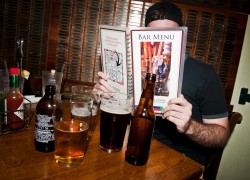
Several studies have recently shed light on the effects of binge drinking.
A new animal study by Washington U. School of Medicine in St. Louis found that binge drinking does not necessarily kill or damage brain cells. Rather, excess alcohol temporarily disables the brain’s ability to learn and create memories.
The National Institute on Alcohol Abuse and Alcoholism defines binge drinking as a pattern of drinking that brings a person’s blood alcohol concentration to 0.08 percent or above. This typically happens when men consume 5 or more drinks and when women consume 4 or more drinks in about 2 hours.
After a night of binge drinking, half of the key receptors in the hippocampus, the brain’s information consolidator, become blocked. Other receptors are activated to produce a steroid that will undermine the brain’s ability to strengthen neuron connections, an essential part of memory and learning.
This new information sheds light on what it means to “black out.”
According to researchers, alcohol doesn’t damage cells. At high BAC levels, brain cells are still communicating. The brain still has the ability to process information, but the brain does not create new memories because key memory receptors are blocked.
Researchers also noted that consumption of drugs, along with alcohol, is more likely to cause blackouts than either substance alone.
According to a study released last Thursday by the Substance Abuse and Mental Health Services Administration, nearly one in four Americans binge drinks during a month’s time.
Studies cite the National Survey on Drug Use and Health, which interviewed 137,000 people from 2008-2009 on the topics of alcohol and drug use.
Results for Louisiana were in the median range.
Approximately 60-65 percent of Louisianians ages 18-25 use alcohol within a month’s time.
Of these residents, 37-40 percent binge drink in a month.
The survey also studied how citizens in each state perceive the risk of having five or more drinks of an alcoholic beverage twice a week.
The survey showed that 36-42 percent of Louisiana residents ages 18-25 think drinking to this extent is a great risk.
States with the greatest percent of residents participating in binge drinking are located in the northern portion of the U.S.
Among the highest were Colorado, Montana, North Dakota, South Dakota, Iowa, Wisconsin, Vermont, New Hampshire and Delaware.
The state with the least perception of risk was Utah.
